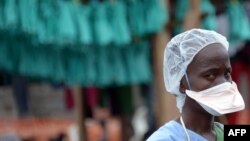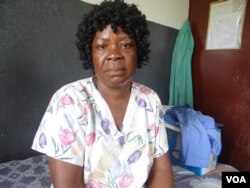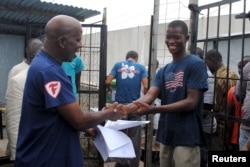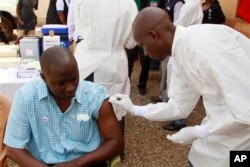One day after the World Health Organization declared all of West Africa Ebola-free, a new case was confirmed in Sierra Leone.
According to the Associated Press, a spokesman for the Office of National Security in Sierra Leone identified the victim, who died, as a 22-year-old woman from the northern part of the country.
The WHO has warned that new cases would likely flare up from time to time because the virus can live on in its victims even after they recover from their symptoms.
The health agency said the local government has responded rapidly and that a team of local authorities, the WHO and other partners are investigating the new case. Sierra Leone's new emergency operations center is coordinating the response and initiating control measures to prevent further transmission.
It's been more than two years since a young boy contracted the first suspected case of Ebola in the forests of Guinea.
The disease has claimed more than 11,000 lives and sickened more than 28,000 people in the West African countries.
Thursday, the WHO declared Liberia Ebola free for the third time since last May. Liberians received the news with mixed emotions.
Hannah Banwon, a nurse who lost 13 members of her family to the disease, said it started with her sister-in-law. Then, her sister started bleeding.
"I told them that it was the sign of Ebola," Banwon said, "but they didn't really believe me, and because of that many of the family died."
"At that time we didn't have enough equipment to help," she said.
And that was the crux of the problem: not enough hospital beds, too many hospitals with no running water or electricity, too few laboratories to diagnose the disease, too few people to trace the contacts of the sick so they could stop the progression of the disease, too slow a response from the international community, and weak public health systems.
The World Health Organization said while flare-ups of Ebola in are expected, another massive outbreak is not.
More work needed
Dr. Tom Frieden, director of the U.S. Centers for Disease Control and Prevention, said the world is better prepared now than it was two years ago, "but not nearly as prepared as we need to be.”
“We need to build systems around the world to find things when they first emerge,” he said, “to stop them rapidly, and to prevent them whenever that's possible."
The CDC sent doctors, epidemiologists, communications specialists and other staff to West Africa to train health workers, teach people how to stay safe, convince them that Ebola is real and very deadly, and help with contact tracing so the disease could be stopped.
Dr. Anthony Fauci, who oversees infectious disease research at the National Institutes of Health, agreed that poor health care systems enabled Ebola to sweep through West Africa with such ferocity.
While it's important to build sustainable health care capacity in low- and middle-income countries, he said, "the countries themselves need to realize that that is an important priority for them, and they need to put the resources in."
A lot has been learned about treating Ebola, Fauci said.
"In the beginning, we heard that it was 90 percent fatal to have Ebola," he said. "Then we found out that when you provide the appropriate care, you can bring that down to 20, 30 percent, sometimes."
When patients were given enough fluids and the symptoms of the disease were addressed, their survival rates improved significantly, even though there is no treatment specifically for the disease itself.
‘Durable’ answers key
Scientists learned things, too, about the value of maintaining strict scientific standards when it comes to experimental treatments.
"We've learned that when you have an outbreak, even though you need to deliver care in the best possible way, that when you do research, you’ve got to do it in a scientifically sound, transparent way, so that when you get an answer, it's a durable answer," Fauci said, because otherwise, "you may wind up at the end of the epidemic not really knowing what works and what doesn't work, which unfortunately, was the case with some of the medications and therapies that were distributed" during the epidemic.
It became abundantly apparent during the outbreak that the World Health Organization was not up to the task of organizing and mobilizing a response to the Ebola outbreak, according to many experts, including Frieden.
"We need a WHO where technical competence rules,” he said, “and where the human resources are fit to what's needed to run programs, to give technical advice, to coordinate among partners."
The WHO has acknowledged its shortcomings and has made recommendations for change.
‘Not about profit alone’
Large pharmaceutical companies like Merck — or MSD, as it is known outside the U.S. — also want to be involved, according to Dr. Julie Gerberding, the company's president.
Gerberding told a conference in Washington that the "Industry steps up because we want to," and that "pharmaceutical companies are not about profit alone."
But beyond that, she stressed that the large pharmaceutical companies can develop and produce vaccines and treatments on the kind of scale that's needed. Merck was instrumental in producing the highly successful Ebola vaccine that was used in Guinea.
But the valuable lessons learned during the Ebola epidemic won't matter if they aren't taken to heart. Nigeria stopped Ebola from spreading in Lagos, a city of 21 million, because of the infrastructure in place to test and isolate Ebola patients. If Ebola had spread through Lagos, the epidemic might not be over.
"I fear that the world will forget how close we got to a total global catastrophe with Ebola, and how much worse it could have been," Frieden said, adding, "That's why it's so important that we implement effective programs rapidly, get other countries around the world to do more to strengthen those core detection and response capacities, and that we have sustained funding" for programs to protect people from global health threats posed by infectious diseases.
Funding is critical.
Lawrence Gostin, a professor of global health law at Georgetown University, told VOA, "We have to keep our foot on the pedal ... because the next time we may not be so fortunate as to have something we can contain. We might have a novel influenza that will literally sweep the world and cause millions of deaths in its wake, and we can't allow that to happen."
Prince Collins contributed to this report from Monrovia, Liberia.







